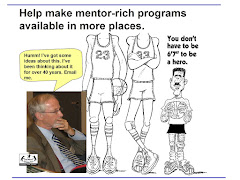I'm attending the National Mentor Summit
next week in Washington, DC and on Monday January 30 I'll be co-hosting a panel discussion of Mentoring leaders from 7pm-8:30 at
First Unitarian Church, Hyde Park, IL. You can see the invitation for that event here.
So how do we build on what takes place in these two events so we can influence the growth of mentor-rich programs in thousands of locations around the country and in the Chicago region?
I'm part of a variety of information sharing networks and one of my Facebook connections posted this thoughtful article this week.
I met with a volunteer who I've known for 30 years yesterday and we both agreed that most adults are too busy to read through articles like this, or to read through all of the ideas and strategies I share on the Tutor/Mentor Institute web site.
We have a society that wants quick fixes to complex problems and with people who have too little time, commitment or discipline to spend time learning about problems and solutions on an on-going basis.
So how do we overcome this? Service Learning.
If we engage young people with this information as part of service learning, study programs, college PhD work, they can spend years building their own understanding. They can also learn to communicate what they are learning in blog articles like the one I pointed to, or like those our interns are posting on the Tutor/Mentor Connection forum.
We can build a new generation of leaders who have dug much deeper into social problems and collective solutions, but who come to adult roles with habits of learning from others in a networked-world.
I wrote about the Broad Foundation last summer because they are putting millions of dollars into an effort to train future leaders who will be embedded in the education infrastructure all over the country within 10-15 years...and they will be connected to each other and the ideas the Foundation will continue to share.
All we need is one philanthropist or business to invest in the Tutor/Mentor Institute in the same way, and we can build a network of leaders who share ideas from our library in every city in the world and who work together to attract the operating and innovating resources needed throughout the network to make these ideas a reality in changing future lives for kids living in economically disadvantaged areas.
It starts with finding researchers/writers who will dig deeper into these ideas and work to share them via their own talent and communications skills.
Wednesday, January 18, 2012
Subscribe to:
Post Comments (Atom)








No comments:
Post a Comment